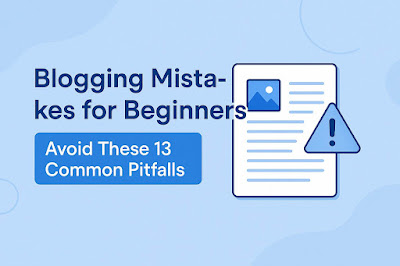Blogging Mistakes for Beginners: Avoid These 13 Common Pitfalls
Blogging Mistakes for Beginners: Avoid These 13 Common Pitfalls

Starting a blog is exciting, but for many beginners, it’s a journey filled with hidden traps.
Making the wrong moves early on can cost you traffic, motivation, and even credibility.
This guide covers the most common blogging mistakes for beginners—the kind that quietly hold your blog back.
If you want to grow fast and build a blog that actually makes money, avoiding these pitfalls is your first smart step.
1. Starting Without a Clear Purpose
Many new bloggers dive in without asking one key question:Why am I starting this blog?
Without a clear purpose, your content will lack direction and consistency.
Before writing your first post, define your goals:
- Do you want to educate, entertain, or inspire?
- Who is your ideal reader?
- Are you blogging as a hobby or business?
2. Ignoring Audience Research
Writing what you think is interesting is not the same as writing what your audience wants to read.Beginner bloggers often skip audience research and end up with content that gets no traffic.
Use free tools like:
- Subreddits related to your niche
3. Choosing the Wrong Blogging Platform
Some beginners start with platforms like Blogger or Wordpress.com because they’re free—but later realize the limitations in design, SEO, and monetization.If you're serious about blogging, go with a self-hosted WordPress.org blog.
It gives you full control, better customization, and the freedom to monetize however you want.
4. Overlooking SEO Basics
Search Engine Optimization (SEO) isn’t just for pros—it’s for anyone who wants traffic from Google.Beginners often make SEO mistakes like:
- Not using keywords
- Writing weak meta descriptions
- Ignoring internal linking
- Skipping image alt text
It’ll make a huge difference over time.
5. Publishing Without a Clear Structure
A wall of text scares readers away.Beginners often write without using:
- Headings (H2, H3)
- Short paragraphs
- Bullet points
- Clear introductions and conclusions
6. Being Inconsistent with Posting
You don’t need to post every day—but consistency is key.One of the biggest mistakes is disappearing for weeks or months.
Build a simple content calendar and stick to it.
Even posting once a week can build momentum over time.
7. Skipping Mobile Optimization
More than half of blog traffic comes from mobile devices.If your blog isn’t mobile-friendly, you’re losing readers fast.
Use a responsive theme and regularly test your blog on phones and tablets.
A slow, clunky mobile experience is one of the fastest ways to lose your audience.
8. Focusing on Quantity Over Quality
Publishing 100 low-effort posts won’t help you rank better than 10 high-quality ones.Focus on writing posts that:
- Solve a specific problem
- Offer real insight
- Are well-researched and organized
9. Not Collecting Emails from Day One
Many bloggers wait too long to start building an email list.Social media platforms can change their algorithms, but your email list is yours.
Use a tool like ConvertKit, Systeme.io, or Google Forms to collect emails.
Offer a freebie (like a checklist or mini-guide) in exchange for subscriptions.
10. Not Monetizing Strategically
Some beginners rush to add ads or affiliate links everywhere.Others avoid monetizing altogether.
The smarter move? Focus on traffic and trust first.
Then monetize with:
- Affiliate marketing
- Sponsored posts
- Digital products
- Ads (once your traffic is high enough)
Start with one method and test what works best for your audience.
11. Weak or Generic Headlines
Headlines are what get people to click.A boring or vague title can ruin even the best article.
Use headline analyzers like:
- Sharethrough Headline Analyzer
12. Not Using Analytics
Blogging without tracking your performance is like driving blindfolded.Set up Google Analytics and Google Search Console from the start.
These tools help you learn:
- Where your traffic comes from
- What keywords you're ranking for
- Which posts perform best
13. Copying Other Blogs Instead of Finding Your Voice
It’s okay to get inspiration—but copying others won't build your brand.Google can also penalize duplicate content.
Instead:
- Find your unique writing voice
- Share personal stories or opinions
- Focus on authenticity over perfection
Conclusion
Every blogger makes mistakes—but smart bloggers learn from them quickly.Avoiding these common blogging mistakes for beginners will save you time, grow your audience faster, and help you build a blog that actually works.
Start simple, focus on your readers, and stay consistent. Your future self will thank you.
Start simple, focus on your readers, and stay consistent. Your future self will thank you.
FAQs
Q: How long does it take to make money blogging?It varies—but with quality content and consistent effort, most bloggers see results within 6–12 months.
Q: Can I use AI tools to help write blog posts?
Yes, but always add your own voice and insights.
Use AI for outlines or brainstorming—not full content creation.
Post a Comment